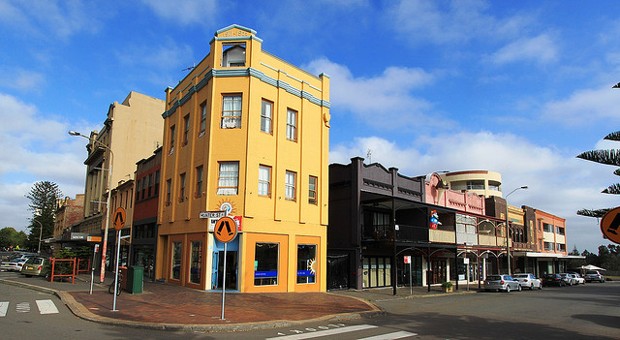{UAH} A Case Study in Reviving a Dying Downtown (JInja /Masaka / Mbale)
A Case Study in Reviving a Dying Downtown
Marcus Westbury's new book, Creating Cities, describes the small-scale fixes that helped Newcastle, Australia.
- Sarah Goodyear
- @buttermilk1
- Sep 15, 2015
In a way, there's nothing special about Newcastle, Australia. Like a lot of other places around the world, this small city on the nation's southeastern shore grew and flourished because of heavy industry—steel, in this case—and declined when that industry collapsed toward the end of the 20th century. Despite a still-thriving coal trade and an active port, Newcastle's downtown emptied out, and its once-bustling central business district became blighted.
In his new book, Creating Cities, Newcastle native Marcus Westbury describes the scene he found in his hometown in 2007:
Newcastle was dying. I thought I had no illusions, but everywhere I looked the rot was worse than I remembered. Streets that in my memories were vibrant, active, and filled with family and friends had fallen into disrepair and despair. Entire blocks were dominated by buildings that had been boarded up, gutted, and destroyed.
Now, eight years later, Newcastle has come alive again. In his book, Westbury describes how he and a group of like-minded people helped to turn the city around—not with grand-scale policy changes or multimillion-dollar building projects, not by attracting huge employers through tax breaks and economic incentives, but through fostering small-scale enterprise in the city's vacant core.
Through a nonprofit group dubbed Renew Newcastle, Westbury and his colleagues enabled artists, entrepreneurs, and small retailers to set up shop in vacant spaces without paying rent. The initiative was powered almost entirely through sweat equity, as well as a stubborn determination to make the most of human capital and municipal assets that were lying vacant. He writes:
Our system was designed to make the city work for people for whom it had not worked in a long time. Our stakeholders were people without capital, for whom barriers to entry, and not certainty or security of outcome were the defining challenge. Digital cottage industries. Online artisans. Artists and fashion designers with market stalls. Bedroom record labels. Flickr photographers. Community groups.
Some of these enterprises were designed to be temporary, writes Westbury. Others wanted to grow into more traditional businesses able to pay market rents for their spaces. Some succeeded on their own terms, some failed. But the overall picture for Newcastle's Hunter Street, in the heart of town, has been one of success, hailed in the local press and noted by international guidebook publisher Lonely Planet, which in 2011 named Newcastle one of the top 10 cities in the world to visit.
 The corner of Pacific and Hunter streets, in Newcastle, in late 2009. (OZinOH / Flickr)
The corner of Pacific and Hunter streets, in Newcastle, in late 2009. (OZinOH / Flickr)Westbury details the numbers behind Renew Newcastle's success: 170 businesses and community projects launched, 70 vacant properties reopened, and a 60 to 90 percent drop in vacancy rates.
Westbury acknowledges Renew Newcastle's critics, who charge that the approach encourages gentrification, that it hasn't produced change fast enough, that the successes are too small and the failures too many. But he argues that the initiative has transformed the way that Newcastle sees itself as well as the way outsiders see it, making it a model for similar cities around Australia and beyond. It is part of an international movement toward lightweight, self-determined urban renewal projects that doesn't seem to be going away anytime soon.
The story that Westbury tells in Creating Cities will likely inspire people who long to create new life and purpose in their own declining places. The approach has its limitations: it doesn't aim to restructure the political life of a place or get to the deeper policy issues that may be driving long-term economic and social trends. Nonetheless, by repudiating the myth of the "big fix" and focusing on small, achievable goals, the Renew Newcastle story serves as an example of how ordinary citizens can take control of the fate of their cities without waiting for top-down solutions from government, developers, and industry. As Westbury writes:
[T]he long-term impact [of Renew Newcastle] is probably just too soon to tell. What will ultimately emerge from the tensions between development and decay, germination and gentrification, commerce and community can only be resolved and revealed by the passage of time. I do believe that we have changed the city for the better. That the actions of hundreds of people have created a new dynamic, and that that dynamic will live on and feed into whatever may happen next.
--
Disclaimer:Everyone posting to this Forum bears the sole responsibility for any legal consequences of his or her postings, and hence statements and facts must be presented responsibly. Your continued membership signifies that you agree to this disclaimer and pledge to abide by our Rules and Guidelines.To unsubscribe from this group, send email to: ugandans-at-heart+unsubscribe@googlegroups.com








0 comments:
Post a Comment